FTM Hysterectomy: A Comprehensive Guide
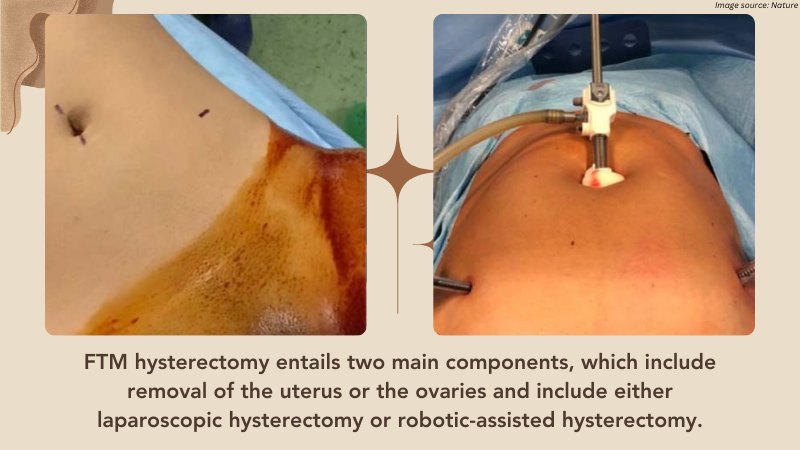
Hysterectomy is a procedure that involves the surgical removal of the fundus and, in other cases, the ovaries or fallopian tubes. If the ovaries are left intact, they secrete estrogen and progesterone hormones. FTM surgery is essential as a gender confirmation surgery as it helps you to align your physical body with your identity.
FTM hysterectomy entails two main components, which include removal of the uterus or the ovaries and include either laparoscopic hysterectomy or robotic-assisted hysterectomy.
Understanding FTM Hysterectomy
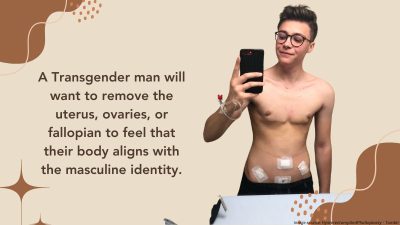
Gender reassignment therapy is integral in helping FTM individuals alleviate gender dysphoria. A Transgender man will want to remove the uterus, ovaries, or fallopian to feel that their body aligns with the masculine identity.
Different Types of Hysterectomy and Their Implications
Total Hysterectomy
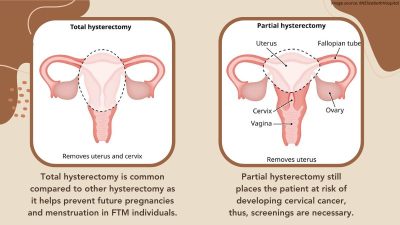 The fundus, fallopian tubes, and cervix are entirely eradicated as incisions are made vaginally or through the abdomen. Total hysterectomy is common compared to other hysterectomy as it helps prevent future pregnancies and menstruation in FTM individuals. It also reduces the risks of cervical cancer.
The fundus, fallopian tubes, and cervix are entirely eradicated as incisions are made vaginally or through the abdomen. Total hysterectomy is common compared to other hysterectomy as it helps prevent future pregnancies and menstruation in FTM individuals. It also reduces the risks of cervical cancer.
Subtotal or Partial Hysterectomy
The fundus is removed as the cervix is left intact. Partial hysterectomy still places the patient at risk of developing cervical cancer, thus, screenings are necessary.
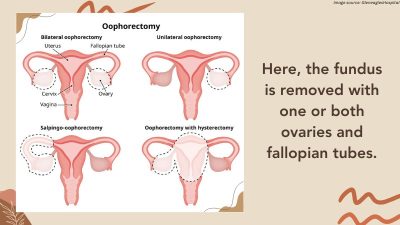
Hysterectomy with Salpingo-Oophorectomy
Here, the fundus is removed with one or both ovaries and fallopian tubes. Additionally, the womb and both ovaries and fallopian tubes are eradicated. With the ovaries removed, you are likely to experience hormone imbalances.
Medical and Psychological Preparation
Preoperative assessment and counseling sessions are essential before your hysterectomy surgery.
 Physical Health Assessment
Physical Health Assessment
You will receive preoperative care that focuses on variable outcomes and impacts the quality of life. You will be enrolled in an all-gender mixed-specialty surgical area. Your vital signs will be checked and you will be asked a host of questions as your surgical team goes through your consent sheet. A pelvic exam will help to confirm identity without assumption. You will have your gender affirmed through various processes and interactions with your preferred pronoun. You will receive counseling on the physical risks of your surgery, such as scarring. The benefits, such as alleviating gender dysphoria, will also be explored.
Mental Health Assessment
 For the most part, mental health concerns surrounding gender identity should not be assumed. In this case, there will be emotional counseling, such as informed trauma with interpersonal relationships, which will foster care management.
For the most part, mental health concerns surrounding gender identity should not be assumed. In this case, there will be emotional counseling, such as informed trauma with interpersonal relationships, which will foster care management.
Issues such as coming out and transitioning and general mental issues such as anxiety, substance use, mood issues, and traumatic disorders will be a source of concern for your healthcare provider. Healthcare providers will counsel you on the informed consent model concerning hormone therapy.
Recovery Process
 You will need up to six weeks to recover completely after the FTM hysterectomy; however, this largely depends on your body. While it’s different for everyone, you must see your surgeon from weeks 4-6. Your wound will be examined for infections or healing problems.
You will need up to six weeks to recover completely after the FTM hysterectomy; however, this largely depends on your body. While it’s different for everyone, you must see your surgeon from weeks 4-6. Your wound will be examined for infections or healing problems.
After your surgery, you are likely to experience pain in your belly and upper chest area and discharge from your vagina, depending on your type of surgery. If you had laparoscopic, expect pain for 2-3 weeks after your procedure, while abdominal pain takes 3-5 weeks of pain. Post-operative care in managing pain and discomfort during recovery will be an integral process after you include the use of painkillers such as Tylenol that the surgeon will recommend.
 While you may not be prepared for the emotional and physical adjustment of hysterectomy, it is essential to recognize the potential emotional adjustment. You may have mild pain depending on your healing process and procedure. Your physical body should begin to feel better after four weeks, you may not have a positive emotional adjustment after your surgery as your gender dysphoria diminishes over time.
While you may not be prepared for the emotional and physical adjustment of hysterectomy, it is essential to recognize the potential emotional adjustment. You may have mild pain depending on your healing process and procedure. Your physical body should begin to feel better after four weeks, you may not have a positive emotional adjustment after your surgery as your gender dysphoria diminishes over time.
Potential Benefits and Considerations
The following are the benefits of hysterectomy.
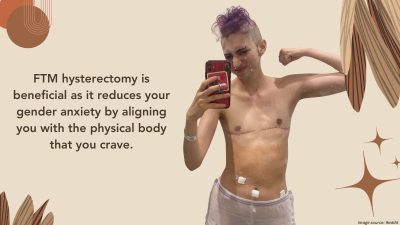 Reducing Gender Anxiety and Improving Mental Health
Reducing Gender Anxiety and Improving Mental Health
FTM hysterectomy is beneficial as it reduces your gender anxiety by aligning you with the physical body that you crave. Knowing you do not have a uterus will help improve your mental health as your anxious thoughts about your identity will be reduced.
- Impact on Hormone Levels and Overall Health
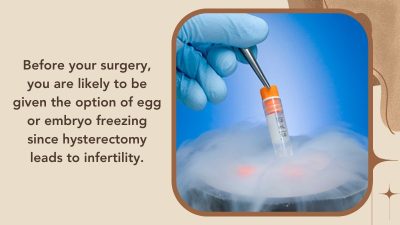 If you choose to have your uterus removed alone, your hormone levels will remain unaffected. However, if you decide to remove your ovaries, hormones will remain constant for a while; however, menopause will set in abruptly. As a result, you are likely to experience changes in your skin, mood, including but not limited to your emotions.
If you choose to have your uterus removed alone, your hormone levels will remain unaffected. However, if you decide to remove your ovaries, hormones will remain constant for a while; however, menopause will set in abruptly. As a result, you are likely to experience changes in your skin, mood, including but not limited to your emotions.
- Consideration of Future Gender Confirmation Surgery and Fertility
Preservation
It is always important to consider your future gender confirmation identity before surgery. It will help you and your healthcare provider come up with adequate solutions regarding the type of surgery to have, whether it is total or sub-total hysterectomy. Before your surgery, you are likely to be given the option of egg or embryo freezing since hysterectomy leads to infertility.
Post-Hysterectomy Care and Lifestyle Modifications
 Post-hysterectomy care and lifestyle modifications will be integral in helping you have a quick recovery while avoiding things that delay your healing. You will be required to have adequate rest but avoid leg crossing. However, you are advised to do movement and light activities around the house in the first few days. Activities such as heavy lifting and soaking in bathtubs are highly cautioned against.
Post-hysterectomy care and lifestyle modifications will be integral in helping you have a quick recovery while avoiding things that delay your healing. You will be required to have adequate rest but avoid leg crossing. However, you are advised to do movement and light activities around the house in the first few days. Activities such as heavy lifting and soaking in bathtubs are highly cautioned against.
Adjusting Hormone Therapy if Necessary
Hormone replacement is a recommendation after hysterectomy to align you with your masculine identity. While everyone is different, it does not hurt to know what to expect from your hormone levels after HRT FTM. Testosterone changes will occur in 1-6 months if you choose to have masculinizing hormones. Changes such as a deepened voice and increased facial hair will likely suffice during this time.

Pelvic Health
You are also required to maintain your pelvic health by exercising to prevent bladder and bowel organ prolapse. Such exercises target your pelvic muscles, which you can identify with the feeling of trying to stop yourself from passing wind. These pelvic muscles require a ‘lift and squeeze’ method. As you breathe normally, you perform long and short squeezes of your pelvic muscle at least thrice a day. Long-term effects such as menopause should be alleviated with hormone replacement therapy.
Psychological Support for Emotional Well-Being and Body Image
 Support from friends and family can go a long way in improving your psychological and emotional well-being. Consider accepting practical help such as support in house help activities such as cleaning, meal preparation, and shopping.
Support from friends and family can go a long way in improving your psychological and emotional well-being. Consider accepting practical help such as support in house help activities such as cleaning, meal preparation, and shopping.
Having company after your operation will allow you to share your thoughts on healing and create a positive outlook that is good for your psychological aspect. You will feel supported in your choice for FTM surgery, which will be integral in your emotional health as well as it will help alleviate your gender dysphoria.
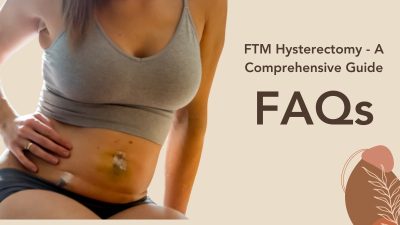 FAQs
FAQs
What is the ideal age or transition stage for an FTM person to consider hysterectomy?
Because FTM eliminates your ability to reproduce, most surgeons assert that a patient should be at least 21 years of age to get a hysterectomy.
How does hormone therapy affect the decision-making process for hysterectomy?
Hormone therapy affects the decision-making process for hysterectomy, affecting which type of hysterectomy is performed.
What are the potential risks and complications of FTM hysterectomy?
Like any surgery, FTM hysterectomy is not devoid of risks. Risks such as tissue scarring, excessive bleeding, damage to internal organs, infections, and blood clots can be part of the surgery. It would help if you communicated these risk concerns with your surgeon. Your surgical team is trained to detect, address, and respond to these risks appropriately. You are also likely to be educated on how to minimize risks.
Can FTM people retain their fertility after undergoing hysterectomy?
You cannot become pregnant after a hysterectomy as an FTM patient because your womb will no longer be available to support a pregnancy.
How does hysterectomy affect hormone levels and ongoing hormone therapy?
Hysterectomy affects hormone levels and, subsequently, ongoing hormone therapy. Hysterectomy for FTM individuals will mean low estrogen if your ovaries are removed. The sudden reduction of estrogen will mean early symptoms of menopause. Thus, with hysterectomy, it is essential to consider replacing hormones to alleviate menopause symptoms. Also, they are given testosterone to align them with secondary sex characteristics of masculinity. However, hormone therapy is a personal decision.
 Conclusion
Conclusion
As an FTM individual undergoing hysterectomy, understanding the impact of surgically eliminating the uterine, cervical, and fallopian tube components of your body calls for pre- and post-operative counseling which is readily available in most healthcare facilities. Consequently, you will be counseled on the effects and risks. Hormone therapy replacement therapy will also be integral in helping you balance your hormones while simultaneously giving you a gender-affirming role. FTM hysterectomy can be beneficial if you want to alleviate your gender dysphoria. Additionally, during a permanent surgery, you can always talk to your healthcare provider concerning egg-freezing procedures as a way to secure your fertility in the future.

 Basic Packers
Basic Packers Pack & Play
Pack & Play STP
STP